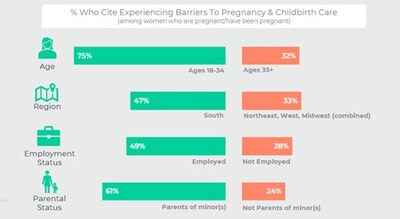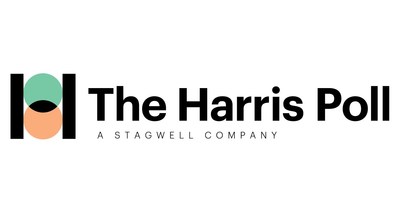More than half of U.S. women feel like they have to fight to get the medical care they need
The Harris Poll, a Stagwell agency, has released its second annual State of Maternal Health Report, revealing significant challenges in maternal healthcare in the United States. The survey, conducted in April 2024 among over 1,000 U.S. women aged 18+, highlights that more than half (53%) of women feel they must fight to receive adequate medical care. Additionally, 39% of women who are currently pregnant or have been pregnant reported difficulties in accessing care during pregnancy and childbirth.
Quality of care issues are especially pronounced among younger women aged 18-34, women in the South, employed women, and mothers with children under 18. Only 42% of pregnant or previously pregnant women felt they had access to the best possible care, down from 50% in 2022. The report also shows disparities based on state reproductive health policies, with women in more restrictive states experiencing greater challenges and lower quality care compared to those in protective states.
The findings indicate a strong demand for reforms, with 83% of women calling for improved safety and quality in maternal healthcare.
- None.
- None.
New Survey by Stagwell (STGW)'s The Harris Poll Reveals Urgent Concerns Regarding Access and Quality of Maternal Healthcare in the
The survey, conducted online in April of 2024 among more than 1,000
Not being able to access such important care can negatively impact the entire pregnancy journey, from experiences to outcomes. Other findings from the survey surrounding care quality include:
- Only
42% of women who are currently pregnant/have ever been pregnant strongly feel they had access to the best possible care when they were pregnant—a significant drop from50% in 2022.- Younger women are particularly affected, with less than a third in the 18-34 age group (
32% ) strongly feeling they received the best possible care.
- Younger women are particularly affected, with less than a third in the 18-34 age group (
- More than 1 in 10 women who have been pregnant say their prenatal care (
11% ), labor care (12% ), and delivery care (12% ) were less than adequate. About 1 in 7 (15% ) say the same of their recovery care, and a whopping 1 in 4 (24% ) say the same of their postpartum care. - About 1 in 7 women who've been pregnant (
14% ) did not feel heard by their provider during their prenatal care visits.
"The data clearly show that not only are many women feeling disregarded and underserved by our healthcare system during one of the most vulnerable times in their lives, but there is also an overwhelming demand for immediate improvements to ensure the safety and well-being of all mothers in America," said Christina Lojek, Research Manager, The Harris Poll. "Furthermore, the results confirm that access to care and care quality issues are becoming more prevalent, and depending on which state you live in, you could be more at risk," she stated.
Notably, two-thirds of women (
When thinking about access and quality of care in the current political environment, location matters. Looking at women who live in states with the most restrictive reproductive health policies*, they are significantly more likely than those who live in protective states to share negative experiences and sentiments surrounding pregnancy and childbirth care:
- Women in the most restrictive states are significantly more likely to feel like they have to fight to get the medical care they need than women who live in protective states (
58% vs.49% ). - Among women who are currently pregnant/have ever been pregnant:
- Those in the most restrictive states are significantly less likely to strongly feel they had access to the best possible care when pregnant than those who live in protective states (
38% vs.50% ). - Nearly half of those in the most restrictive states (
48% ) say they experienced challenges to accessing care during pregnancy and childbirth, compared to less than a third (31% ) of those in protective states, and are about twice as likely to report insurance-related barriers (20% vs.11% ).
- Those in the most restrictive states are significantly less likely to strongly feel they had access to the best possible care when pregnant than those who live in protective states (
- Among women who have been pregnant:
- Those in the most restrictive states are more than twice as likely as those in protective states to cite less than adequate prenatal (
17% vs.7% ) and labor (19% vs.9% ) care. - Those in the most restrictive states are twice as likely to say they did not feel heard by their provider during prenatal care visits as women who live in protective states (
20% vs.9% ), and more than 4 times as likely to strongly feel this way (9% vs.2% ).
- Those in the most restrictive states are more than twice as likely as those in protective states to cite less than adequate prenatal (
In light of these findings, there is a clear call to action for healthcare providers, policymakers, and community leaders to take decisive measures towards reforming maternal healthcare practices and policies. Ensuring that all pregnant women have access to the highest standard of care needs to be an urgent public health priority.
*Definitions for states' reproductive health policies were derived from Guttmacher Institute. Most restrictive states include
Survey Method:
The 2024 State of Maternal Health survey was conducted online in the
About The Harris Poll
The Harris Poll is a global consulting and market research firm that strives to reveal the authentic values of modern society to inspire leaders to create a better tomorrow. It works with clients in three primary areas: building twenty-first-century corporate reputation, crafting brand strategy and performance tracking, and earning organic media through public relations research. One of the longest-running surveys in the
Contact:
Christina Lojek
christina.lojek@harrispoll.com
![]() View original content to download multimedia:https://www.prnewswire.com/news-releases/more-than-half-of-us-women-feel-like-they-have-to-fight-to-get-the-medical-care-they-need-302179167.html
View original content to download multimedia:https://www.prnewswire.com/news-releases/more-than-half-of-us-women-feel-like-they-have-to-fight-to-get-the-medical-care-they-need-302179167.html
SOURCE Stagwell Inc.









